- Skip to content
- Skip to footer

Computational Precision Health


PhD Program
The PhD in Computational Precision Health leverages and bridges the complementary expertise and incredible resources of UC Berkeley and UCSF to create an unparalleled and truly unique learning environment.
Students in the PhD in Computational Precision Health will develop foundational competency in the computational and mathematical sciences (e.g., machine learning, AI, causal and statistical inference, and algorithmic bias and fairness), drawing from motivating examples from the health domain. Students will be introduced to the health sciences (clinical decision sciences and cognitive informatics, clinical delivery, clinical research, implementation science, health information policy, etc.) through program activities to provide the context for computational problems in the field of CPH.
Students will develop the ability to work in interdisciplinary teams from ideation to development, testing, and validation in the real world. Coursework is complemented by extensive and early interaction with world-class faculty–through research rotations, seminar series, and practicums–at the intersection of computation and health, and students will develop proficiency in cross-disciplinary research and communication. A focus on diversity, equity and inclusion, human-centered design accommodating diverse users, and the ethical implications and societal impacts of the work is embedded throughout the program.
Students interested in applying to the PhD program may contact Bianca Victorica [email protected] for information. Students are also encouraged to reach out to AGG faculty to discuss their interests. See details on Admissions page
Program Requirements
Normative time to degree: 5 years.
Students will enter the PhD program in Computational Precision Health from a wide range of backgrounds, so each program of study will be personalized to and tailored to student background, and goals.
All students will complete:
- CPH Cornerstone course series (3 semester units, 2 semesters)
- CPH Practicum series (2 semester units, 2 semesters)
- CPH Doctoral Seminar series (2 semester units, 6 semesters)
- Foundational courses: Minimum of four classes, selected in close consultation with their Academic Advisor (year 1) or Research Advisor(s) (year 2).
- Advanced Electives: Minimum of two advanced electives, based on intended dissertation work.
- Race and Racism in Science, and Ethics; The Responsible Conduct of Research (1.3 semester units; 1 semester unit)
- Rotations: Students will take two 10-week research group rotations in their first year. One rotation in a predominately computational lab (with health emphasis) and one in a predominantly health science lab (with computational focus).
Qualifying Exams (QEs)
The oral qualifying exam is an important milestone, intended to certify that a PhD candidate is on track to progress to the research phase of their graduate studies. Each student should pass the QE by the end of the fourth semester.
The exam will evaluate the depth of student knowledge in their research area, breadth of knowledge in fundamentals of computational precision ehealth, ability to formulate a research plan, and critical thinking. Specifically, the QE in CH will cover fundamentals of computational science, fundamentals of health science, and the student’s area of specialization.
QE Committee
The QE Committee will consist of four members of the Berkeley or UCSF Academic Senates: three CPH AGG core faculty members, and an outside member, who may be a CPH AGG affiliate, but must be a Senate member from the same home campus as the student. At least one faculty member from each campus must be included. The QE Committee Chair must be a core member of the CPH AGG and from the same home campus as the student.
Dissertation
All dissertation projects must be scholarly, independent and original research that implements knowledge, techniques, and methods from the computational and health sciences to contribute new knowledge to the field. Students will commence work on their dissertation by the fourth semester, after advancing to candidacy.
Dissertation Committee
The Dissertation Committee will consist of at least three members of the Berkeley or UCSF Academic Senates, with at least one member from each. The student’s Research Advisor (or co-Advisors) will serve as the Chair (or co-Chairs). The Chair and Academic Senate Representative must both be members of the Academic Senate and from the same home campus as the student.
Oral Presentations
A dissertation defense will not be required ; however, students will be required to present their research orally on a number of occasions, including during the Doctoral seminar, and during program retreats.

Quick Links
About CPH PhD Admissions DE Admissions Faculty Research
Mailing List
Computational Precision Health

About the Program
Computational Precision Health (CPH) is an exploding field across both academia and industry. This rapidly evolving field integrates the tremendous advances in data science and data availability that have occurred over the past decades with expertise in clinical medicine, public health, and health care systems to enable a paradigm shift in the ways we treat and prevent disease. Advances in data and analytics open the door to faster deployment of more effective health interventions, but this potential can only be achieved if the underlying computational and analytic tools are conceived, tested, and validated for the health and health care needs of diverse individuals and communities. The field of Computational Precision Health aims to realize this potential.
The PhD in Computational Precision Health leverages and bridges the complementary expertise and incredible resources of UC Berkeley and UCSF to create an unparalleled and truly unique learning environment. Students in the PhD in Computational Precision Health will develop skills and expertise in both the computational sciences (machine learning and AI, natural language processing, statistical inference and modeling, data standards, parallel computing and data at scale, etc.) and health sciences (clinical decision sciences and cognitive informatics, clinical delivery, clinical research, implementation science, health information policy, etc.)
Students will develop the ability to work in interdisciplinary teams from ideation to development, testing, and validation in the real world. Coursework will be complemented by extensive and early interaction with world-class faculty—through research rotations, seminar series, and practicums—at the intersection of computation and health, and will develop proficiency in cross-disciplinary research and communication. A focus on diversity, equity and inclusion, human-centered design accommodating diverse users, and the ethical implications and societal impacts of the work will be embedded throughout the program.
Designated Emphasis
The Designated Emphasis in CPH is administered by the joint UC Berkeley/UCSF Computational Precision Health Augmented Graduate Group. The UCB CPH DE allows PhD students from affiliated UCB programs to incorporate CPH courses and advising into their PhD. CPH DE students will receive a solid grounding in the fundamentals of computational precision health, with training in the application of computation to the practice of medicine and public health. Students will be part of an interdisciplinary, intercampus community of UC Berkeley and UCSF scholars with diverse academic backgrounds, providing unique cross-campus opportunities, including direct exposure to the clinical care and health science environment offered at UCSF.
Visit Program Website
PhD Admissions
The PhD program in Computational Precision Health welcomes students from a broad range of computational sciences, health sciences, and interdisciplinary backgrounds.
Applications are submitted via the UC Berkeley Graduate Division application portal. More information about requirements .
Designated Emphasis (DE) Admissions
A designated emphasis (DE) is an interdisciplinary specialization, such as a new method of inquiry or an important field of application, which is relevant to two or more existing doctoral degree programs. A DE is not a standalone program, but is offered to complement a student’s current doctoral studies. UC Berkeley PhD students are welcomed to apply as well as students from UCSF affiliate programs. More information.
Students are encouraged apply at least two semesters before your Qualifying Examination by submitting the following materials to the Computational Precision Health Program, by emailing the documents below to [email protected] .
- Petition for Admission to the Designated Emphasis in Computational Precision Health .
- Letter of intent summarizing your research interests and background in Computational Precision Health. When possible, the letter should include one or more CPH Core Graduate Group faculty members from your home campus as potential DE advisors
- Letter of recommendation from a CPH Graduate Group Core or Affiliate faculty member, ideally from your home campus.
- An updated CV and academic transcript
Doctoral Degree Requirements
Courses may be taken at ucsf or uc berkeley :, cph 215 : lab rotations (at least 4 units x 2 semesters in the first year).
Students will take two 10-week research group rotations in their first year. One rotation will be on each campus, with one rotation in a predominantly computational science “lab” (with a health emphasis) and one in a health science “lab” (with a computational emphasis).
CPH 270 : Computational Precision Health Seminar (2 semester units x 6 terms)
Students will enroll in six terms of the doctoral seminar, including the first two terms after matriculation. Seminar will consist of journal club-style discussion of recent literature in computational precision health, talks by guest faculty, and presentations by second and third year students on work in progress. Seminar will consist of journal club-style discussion of recent literature in computational precision health, talks by guest faculty, and presentations by second and third year students on work in progress.
UCSF courses
Three-part cornerstone series, taken at ucsf (3 units x 3 quarters).
CPH 200A, CPH 200B AND CPH 200C: COMPUTATIONAL PRECISION HEALTH CORNERSTONE COURSE SERIES (3 UNITS PER COURSE, 3 UNITS PER QUARTER FIRST YEAR) This course series, which uses Problem-Based Learning to build student’s ability to work effectively in interdisciplinary teams, from ideation to development, testing, and validation in the real world.
CPH 201A: CPH PRACTICUM (3 UNITS): Provides the foundations for understanding and engaging with inpatient and outpatient clinical care. Students will gain deep and continuing exposure to the clinical and public health contexts in which CPH advances are to be deployed. Students will have in-depth real world exposure relevant to problem area(s) covered in the problem-based learning core, including clinical, research, and operational work in inpatient, outpatient, community health, and/or public health settings, AND
CPH 201B: CPH PRACTICUM (3 UNITS): A 2-semester course series taken during the second year of Computational Precision Health, augmenting the Cornerstone course to provide deep and continuing exposure to the clinical and public health contexts in which CPH advances are to be deployed. Students will have in-depth real world exposure relevant to problem area(s) covered in the problem-based learning core, including clinical, research, and operational work in inpatient, outpatient, community health, and/or public health settings.
Designated Emphasis Requirements
Curriculum/coursework.
Students admitted to the CPH DE program must complete two semesters of the CPH Doctoral Seminar, and at least 3 courses from the core course list below, in the following two domain areas:
- Health and Public Health Sciences
- Computing and Statistical Sciences
In order to ensure that the DE confers sufficient additional breadth beyond a student’s home program, students in a primarily computational PhD program (for example, Bioengineering, Electrical Engineering and Computer Science, Computer Science, Statistics, Biostatistics, Computational Biology, Industrial Engineering and Operations Research) will be required to take at least two courses in the health domain; those in Epidemiology and Health Policy will be required to take at least two courses in the Computational Sciences domain.
Core Courses
Qualifying courses are listed below. Additional courses falling within the two domains below may also qualify, to be approved by the student’s DE advisor.
1. Health and Public Health Science
2. computing and statistical sciences.
In some cases, for example, STAT 154 and STAT 156 / STAT 256 , an upper division undergraduate course may be acceptable for the DE. This is due to the desire to accommodate students from non-computational PhD programs who may not have the programming, mathematics or statistics prerequisites for corresponding graduate-level coursework.
CPH Doctoral Seminar
In addition, students will participate in at least 2 semesters of the CPH Doctoral Seminar. The seminar will consist of a combination of journal club-style discussion of recent literature in Computational Precision Health, and guest faculty speakers drawn from across the CPH Graduate Group and beyond. This seminar will be held in conjunction with UCSF DE CPH students.
Elective Courses
No Elective courses are required for the Designed Emphasis, but the DE Advisor may guide students on additional courses to supplement their training in this field.
UC Berkeley Affiliated Programs
PhD in Bioengineering
PhD in Electrical Engineering and Computer Sciences
PhD in Computer Science
PhD in Biostatistics
PhD in Statistics
PhD in Computational Biology
PhD in Epidemiology
PhD in Health Policy
PhD in Industrial Engineering and Operations Research
PhD in Information Science
*Students from any PhD program at UC Berkeley are welcome to apply.
Normative Time
No additional time can be added to the normative time of your home department.
Contact Information
Director, UC Berkeley UCSF Joint Program in Computational Precision Health
Maya Petersen, MD, PhD
Ida Sim, MD, PhD
Senior Administrative Officer
Rhiannon Lewis
Graduate Student Affairs Officer
Bianca Victorica
Print Options
When you print this page, you are actually printing everything within the tabs on the page you are on: this may include all the Related Courses and Faculty, in addition to the Requirements or Overview. If you just want to print information on specific tabs, you're better off downloading a PDF of the page, opening it, and then selecting the pages you really want to print.
The PDF will include all information unique to this page.

Computational Precision Health Jt PhD (joint UCSF)
Computational Precision Health (CPH) is an exploding field across both academia and industry. This rapidly evolving field integrates the tremendous advances in data science and data availability that have occurred over the past decades with expertise in clinical medicine, public health, and health care systems to enable a paradigm shift in the ways we treat and prevent disease. Advances in data and analytics open the door to faster deployment of more effective health interventions, but this potential can only be achieved if the underlying computational and analytic tools are conceived, tested, and validated for the health and health care needs of diverse individuals and communities. The field of Computational Precision Health aims to realize this potential.
The PhD in Computational Precision Health leverages and bridges the complementary expertise and incredible resources of UC Berkeley and UCSF to create an unparalleled and truly unique learning environment. Students in the PhD in Computational Precision Health will develop skills and expertise in both the computational sciences (machine learning and AI, natural language processing, statistical inference and modeling, data standards, parallel computing and data at scale, etc.) and health sciences (clinical decision sciences and cognitive informatics, clinical delivery, clinical research, implementation science, health information policy, etc.)
Students will develop the ability to work in interdisciplinary teams from ideation to development, testing, and validation in the real world. Coursework will be complemented by extensive and early interaction with world-class faculty-through research rotations, seminar series, and practicums-at the intersection of computation and health, and will develop proficiency in cross-disciplinary research and communication. A focus on diversity, equity and inclusion, human-centered design accommodating diverse users, and the ethical implications and societal impacts of the work will be embedded throughout the program.
Designated Emphasis
The Designated Emphasis in CPH is administered by the joint UC Berkeley/UCSF Computational Precision Health Augmented Graduate Group. The UCB CPH DE allows PhD students from affiliated UCB programs to incorporate CPH courses and advising into their PhD. CPH DE students will receive a solid grounding in the fundamentals of computational precision health, with training in the application of computation to the practice of medicine and public health. Students will be part of an interdisciplinary, intercampus community of UC Berkeley and UCSF scholars with diverse academic backgrounds, providing unique cross-campus opportunities, including direct exposure to the clinical care and health science environment offered at UCSF.
Contact Info
[email protected]
Warren Hall Suite 120, 2195 Hearst Avenue
Berkeley, CA 94720
At a Glance
Department(s)
Augmented Graduate Group
Admit Term(s)
Application Deadline
December 11, 2023
Degree Type(s)
Doctoral / PhD
Degree Awarded
Joint Ph.D.
GRE Requirements

Leading the Biomedical Revolution in Precision Health
Precision Health reimagines medicine to focus on predicting, preventing, and curing disease precisely. Marrying two seemingly different approaches — high-tech and high-touch — this Stanford Medicine vision tailors health care to the unique biology and life circumstances of each individual, with an emphasis on catching disease before it strikes. Precision Health represents a fundamental shift to more proactive and personalized care that empowers people to lead healthy lives.
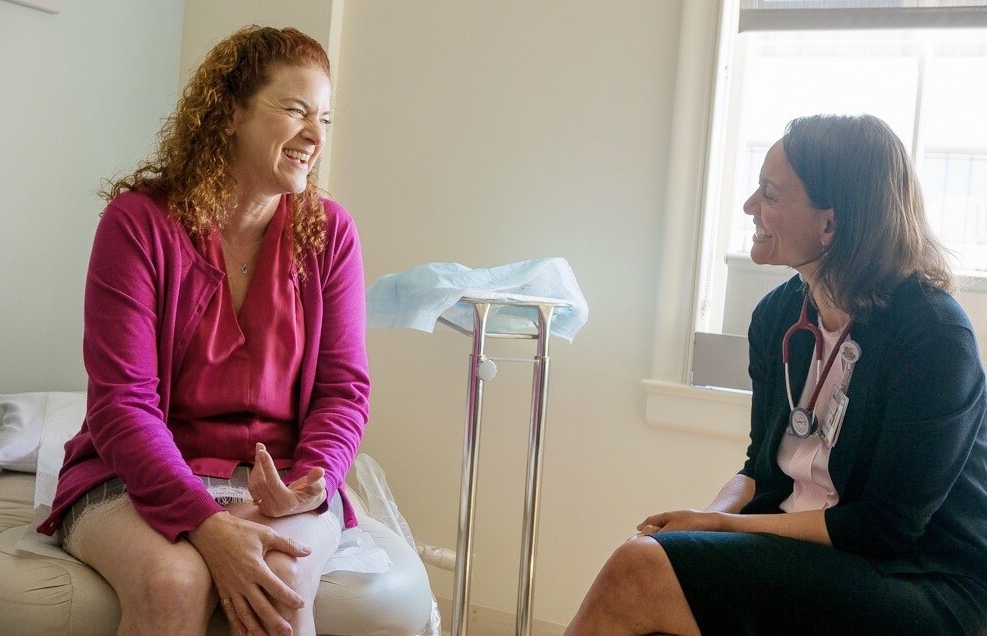
2020 Health Trends Report spotlights the rise of the data-driven physician

Humanwide: Bringing Precision Health to Life

Read an excerpt from Discovering Precision Health

The new Stanford Hospital blends technology, innovation to improve care

How DNA testing can personalize patient care
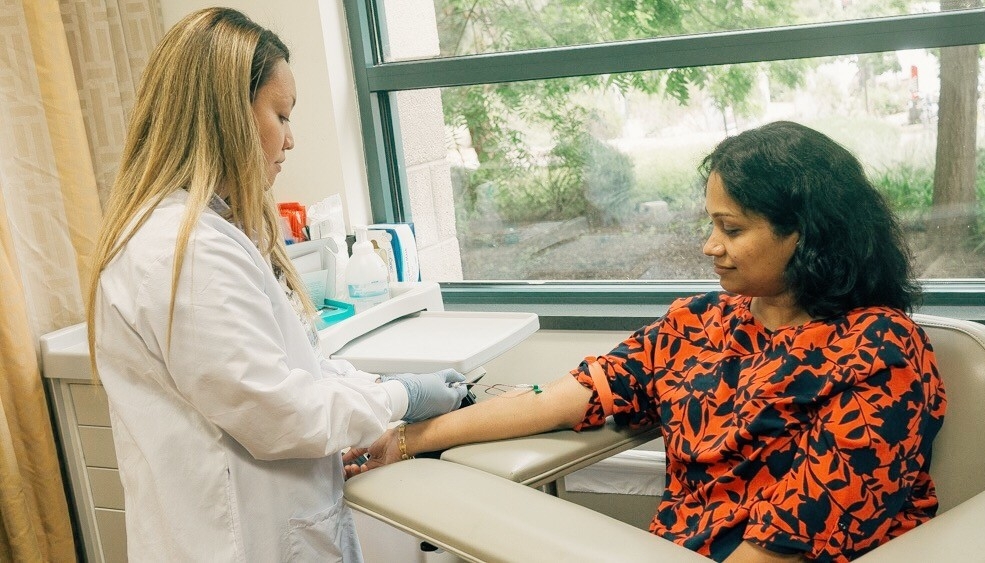

‘Ageotypes’ provide window into how individuals age
Michael Snyder is the senior author of a study that identified specific biological pathways along which individuals age over time.

Precision Health News
- March 12, 2024 Our bacteria are more personal than we thought, Stanford Medicine-led study shows
- February 20, 2024 Stanford Medicine study identifies distinct brain organization patterns in women and men
- October 3, 2023 Neurooncologist Reena Thomas receives CIRM award of nearly $12 million for immunotherapy research
More Precision Health News
Follow Stanford Medicine

Institute for Population and Precision Health (IPPH)
The 2015 U.S. Precision Medicine Initiative (PMI) promised a new era of biomedical research and its application in health care. The initiative is enabled by rapid advances in biomedical sciences, including genomics and bioinformatics, as well as the progress in communication, information technologies and data science. Although the original idea of precision medicine implied an enhanced ability to treat a patient given his/her unique set of characteristics the notion has been expanded as ‘precision health’ to encompass broader preventive, diagnostic and population contexts.
The word “precision” in the context of population health can be simply described as improving the ability to prevent disease, promote health and reduce health disparities in populations by: 1) applying emerging methods and technologies for measuring disease, pathogens, exposures, behaviors, and susceptibility in populations; and 2) developing policies and targeted public health programs to improve health. Our ongoing work at the University of Chicago is consistent with national goals and is complementary to the national efforts.
The Institute for Population and Precision Health brings together researchers from multiple academic units across University of Chicago, and provides them with population-based resources to tackle the most challenging biological, behavioral, and economic problems in preventive and population medicine. The University’s excellence across these disciplines provides an interdisciplinary Institute that has the capacity to focus its collective expertise on population and precision health research.
Key Initiatives
- Chicago Center for Health and Environment (CACHET)
- Chicago Multiethnic Population and Surveillance Study (COMPASS)
- COVID-19 Vaccine and Prevention Studies
- Illinois Precision Medicine Consortium – All of Us Research Program
- UChicago Research Bangladesh
- Health Effects of Arsenic Longitudinal Study (HEALS)
- National Cancer Institute – Connect for Cancer Prevention
- Discover novel scientific breakthroughs.
- Train next-generation precision health scientists with a new Masters of Science in Precision Health graduate program. (Coming soon)
- Translate and implement innovative health solutions into the community.
SIGN UP FOR UPDATES
Of Interest

Congrats to these PH Members for their promotions!
At the May 16th meeting of the U-M Regents, 18 Precision Health members received promotions, and/or were awarded tenure for the first time. We’d like to take a moment to congratulate them for their accomplishments, and share our pride:

Catch April’s Member Research Highlights!
Make sure to take a look at the most recent research from our Precision Health members. Each month we compile the precision health and health-centric research that our faculty/researcher members have published; submit your recent research to phmembership@umich.edu for next month’s Highlight!

UM Awarded $500K, 2 Yr AHA Grant for project focused on predicting hypertrophic cardiomyopathy (HCM)
UM researchers were recently awarded a $500,000, two-year grant through the American Heart Association (AHA) for a project focused on predicting the presence of hypertrophic cardiomyopathy (HCM) in patients who were previously undiagnosed from common tests available in the electronic health record like electrocardiograms and echocardiograms.
The project lead is Sardar Ansari , PhD, Research Assistant Professor of Emergency Medicine. Co-investigators include Precision Health Co-Director Brahmajee Nallamothu , MD, Adam Helms, MD, & John Donnelly , MSPH, PhD, all of UM Michigan Medical School. They’ll be working alongside other sites including John Hopkins, UT Southwestern & Stanford University.
Feature Stories

Workgroup Leader Megan Haymart receives $3.3 M grant from the National Cancer Institute
With a new $3.3 million grant from the National Cancer Institute (NCI), Precision Health member and workgroup leader Megan Haymart, MD, will identify survivors at different risks of recurrence and… more

Residential Address Amplifies Health Disparities and Risk of Infection in Individuals With Diabetic Foot Ulcers
Precision Health members Brian M. Schmidt, Yiyuan Huang, Mousumi Banerjee, Salim S. Hayek, and Rodica Pop-Busui have a new publication to share, “Residential Address Amplifies Health Disparities and Risk of… more

Join the Discovery! Spring Membership Drive
Precision Health is actively looking for new members! U-M Faculty: enable your research with access to datasets, analytics tools & resources, and a motivated, engaged peer community.
Join by April 15, 2024 to become part of the Spring Member Cohort and be featured in April’s Precision Health newsletter.

- North Campus Research Complex, Bldg 100 1701-1751 Huron Pkwy, Ann Arbor, MI 48105
- +1 (734 615-1493)
- Accéder au menu principal
- Accéder au contenu
Precision Health
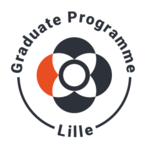
The “Precision Health” Graduate programme aims at training students from scientific and health backgrounds (medicine, pharmacy, dentistry, maieutics) or bioinformatics in innovative concepts that will guide the research and health areas of tomorrow.
The objective is to offer a research training through research, integrating master's and doctoral teaching .
Research Labs
Master Precision Health
Doctoral School
3 key principles
- Interdisciplinary skills
- International experience
- Preparing your future career
The Graduate Programme Precision Health aims at encouraging the Master and PhD students to meet around three core topics of the Biology-Health field:
- To promote Biology applied to Precision Health
- To encourage the digital revolution applied to the Biology and Health field
- To Optimise the positive impact of the different Precision Health researches
Main events
- Begining of the year event for the Master Precision Health, in the begining of September
- Precision Health Day : in November, a day of conferences in a place outside the University tailored to encourage the students and scientists to discuss around key topics.
- End of the year event : taking place in June
- Summer School : the second edition will take place in July 2024
Acces and teaching program offered in Precision Health
The Precision Health Pathway of the Graduate Programs is open to national and international Master's and PhD students with SCI, MD, PharmaD or BioInfo training.
The core of the theoretical teaching of the Graduate Programme consists of 10 seminars taught in English, of 1-2 days, in the form of conferences given by local or international experts, focusing on innovative technologies (generation and use of big data, AI, etc.) with examples of applications chosen in the 4 major disciplinary fields of the health sector (Cancer, Diabetes and cardio-metabolic diseases, Neurosciences, Infectious and immuno-inflammatory pathologies) , justifying a specific approach on the long term, from screening to prevention of complications.
- From OMICS to systems biology
- Precision imaging and health
- The molecular bases of pathologies and treatments
- Artificial Intelligence and Precision Health
- New modes of action of personalized medicines
- Innovative medical devices
- Using patient cohorts for cutting-edge research
- Public health policy and health economics, in light of precision health
- Ethics, health and society
Scholarships and international mobility grants are offered.
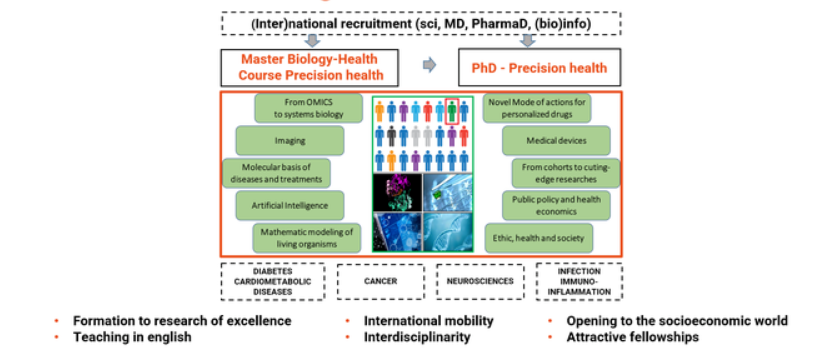
The Graduate Programme recently had the honor of hosting Pr. Thomas Fauchez, a true space pioneer, who shared his experiences from the renowned NASA.…
![[Translate to English:] [Translate to English:]](https://graduate-programmes.univ-lille.fr/fileadmin/_processed_/0/7/csm_04_1Post_RS_Ge__ne__ral_3df1764047.png)
What are the career opportunities after a PhD? The 100% digital job fair For doctoral∙es, doctor∙es and master∙es students
![[Translate to English:] [Translate to English:]](https://graduate-programmes.univ-lille.fr/fileadmin/_processed_/3/7/csm_Follow_us_social_media__2b8c0ed75c.png)
Graduate Programme students and alumni, ready to expand your horizons and discover new opportunities? Follow us on our social channels!
See all news

An official website of the United States government
Here’s how you know
Official websites use .gov A .gov website belongs to an official government organization in the United States.
Secure .gov websites use HTTPS A lock ( A locked padlock ) or https:// means you’ve safely connected to the .gov website. Share sensitive information only on official, secure websites.
- Heart-Healthy Living
- High Blood Pressure
- Sickle Cell Disease
- Sleep Apnea
- Information & Resources on COVID-19
- The Heart Truth®
- Learn More Breathe Better®
- Blood Diseases and Disorders Education Program
- Publications and Resources
- Blood Disorders and Blood Safety
- Sleep Science and Sleep Disorders
- Lung Diseases
- Health Disparities and Inequities
- Heart and Vascular Diseases
- Precision Medicine Activities
- Obesity, Nutrition, and Physical Activity
- Population and Epidemiology Studies
- Women’s Health
- Research Topics
- Clinical Trials
- All Science A-Z
- Grants and Training Home
Policies and Guidelines
Funding opportunities and contacts, training and career development.
- Email Alerts
- NHLBI in the Press
- Research Features
- Past Events
- Upcoming Events
- Mission and Strategic Vision
- Divisions, Offices and Centers
- Advisory Committees
- Budget and Legislative Information
- Jobs and Working at the NHLBI
- Contact and FAQs
- NIH Sleep Research Plan
- < Back To Home
Grants and Training
COVID-19: Information for NIH Applicants and Recipients of NIH Funding
Grants and Funding Topics

Learn more about NOT-OD-23-032

Find out how
University of Missouri
Nextgen precision health | university of missouri | mu health care, ahmed balboula, dvm, phd.
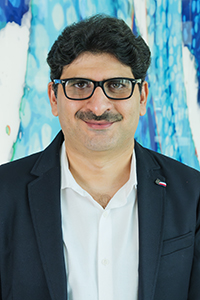
Assistant Professor, Division of Animal Sciences, College of Agriculture, Food and Natural Resources
NextGen Focus Area: Oocyte Meiosis and Developmental Biology
Research conducted in the Balboula laboratory employs cutting-edge imaging technologies, transgenic mouse models and genetic approaches to understand the molecular mechanisms regulating mammalian oocyte meiosis and early embryonic development.
Precision Health Impact:
Chromosome mis-segregation frequently occurs during oocyte meiosis, resulting in aneuploidy (abnormal number of chromosomes in the cell), the leading genetic cause of infertility and congenital abnormalities such as Down syndrome. Understanding the molecular mechanisms regulating mammalian oocyte meiosis is essential for addressing a significant gap in our knowledge of why oocyte meiosis is prone to errors and for improving female fertility.
Publications:
Londoño-Vásquez D, Rodriguez-Lukey K, Behura SK, Balboula AZ. Microtubule organizing centers regulate spindle positioning in mouse oocytes . Dev Cell. 2022 Jan 24;57(2):197-211.e3.
Kincade JN, Hlavacek A, Akera T, Balboula AZ. Initial spindle positioning at the oocyte center protects against incorrect kinetochore-microtubule attachment and aneuploidy in mice . Sci Adv. 2023 Feb 17;9(7):eadd7397.
Ezz MA, Takahashi M, Rivera RM, Balboula AZ. Cathepsin L regulates oocyte meiosis and preimplantation embryo development . Cell Prolif. 2024 Jan;57(1):e13526.
Londoño-Vásquez D, Jurkevich A, Balboula AZ. Multi-Photon Laser Ablation of Cytoplasmic Microtubule Organizing Centers in Mouse Oocytes . J Vis Exp [Internet]. 2022 Nov 11;(189).
Jung GI, Londoño-Vásquez D, Park S, Skop AR, Balboula AZ, Schindler K. An oocyte meiotic midbody cap is required for developmental competence in mice . Nat Commun. 2023 Nov 16;14(1):7419.
Google Scholar
Email: [email protected] Department website: https://cafnr.missouri.edu/directory/ahmed-balboula
Researchers
Reproductive Health
New AI-powered statistics method has potential to improve tissue and disease research
Research team hopeful that the method, called IRIS, can provide more detailed information for precision health treatment plans and health outcomes.
Researchers at Brown University and the University of Michigan have developed a new computational method, IRIS, to analyze complex tissue data which could transform our current understanding of diseases and how we treat them.
Integrative and Reference-Informed tissue Segmentation (IRIS) is a novel machine learning and artificial intelligence method that gives biomedical researchers the ability to view more precise information about tissue development, disease pathology and tumor organization.
The findings were published today in the journal Nature Methods.
IRIS draws from data generated by spatially resolved transcriptomics (SRT) and uniquely leverages single-cell RNA sequencing data as the reference to examine multiple layers of tissue simultaneously and distinguish various regions with unprecedented accuracy and computational speed.
“Different from existing methods, IRIS directly characterizes the cellular landscape of the tissue and identifies biologically interpretable spatial domains, thus facilitating the understanding of the cellular mechanism underlying tissue function,” said Ying Ma , assistant professor of biostatistics at the Brown University School of Public Health and co-developer of IRIS. “We anticipate that IRIS will serve as a powerful tool for large-scale multi-sample spatial transcriptomics data analysis across a wide range of biological systems.”
Unlike traditional techniques that yield averaged data from tissue samples, SRT provides a much more granular view, pinpointing thousands of locations within a single tissue section. However, the challenge has always been to interpret this vast and detailed dataset, says Xiang Zhou , professor of biostatistics at the University of Michigan School of Public Health and senior author of the paper, who worked closely with Ma to develop IRIS.
Interpreting large and complex datasets is where IRIS becomes a helpful tool—its algorithms sort through the data to identify and segment various functional domains, such as tumor regions, and provide insights into cell interactions and disease progression mechanisms.
We anticipate that IRIS will serve as a powerful tool for large-scale multi-sample spatial transcriptomics data analysis across a wide range of biological systems.
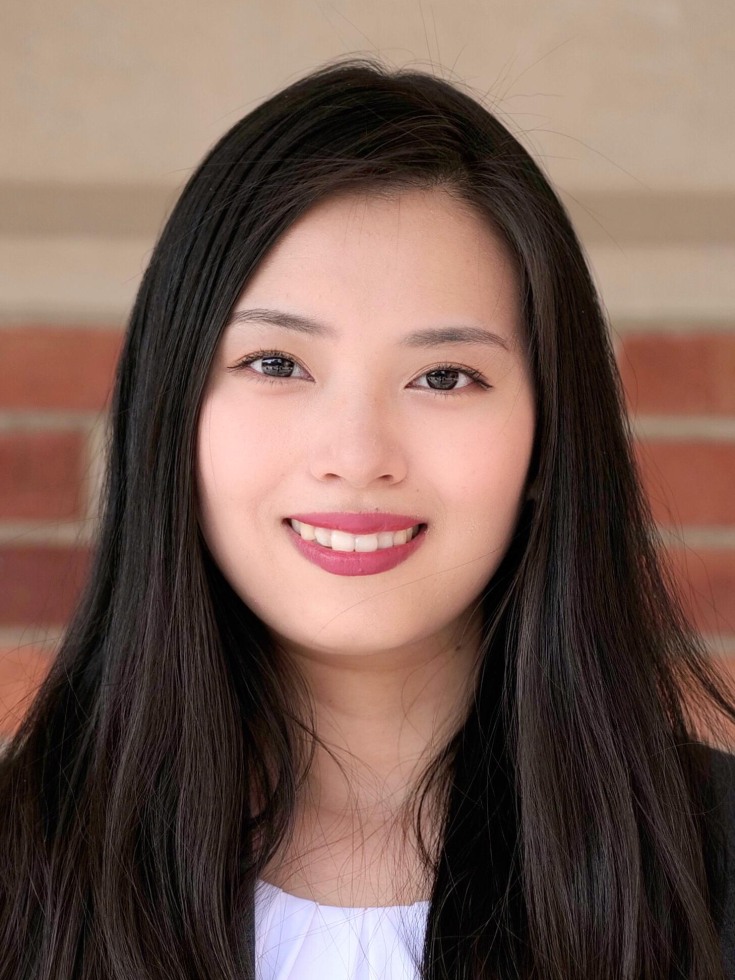
In the study, the researchers applied IRIS to six SRT datasets and compared its performance to other commonly used spatial domain methods. IRIS significantly outperformed other methods in accuracy. Ultimately as SRT technology continues to grow in popularity and use, the researchers hope to see methods like IRIS help to potentially develop targets for clinical interventions or drug targets, improving personalized treatment plans and patient health outcomes.
“The computational approach of IRIS pioneers a novel avenue for biologists to delve into the intricate architecture of complex tissues, offering unparalleled opportunities to explore the dynamic processes shaping tissue structure during development and disease progression. Through characterizing refined tissue structures and elucidating their alterations during disease states, IRIS holds the potential to unveil mechanistic insights crucial for understanding and combating various diseases.” said Zhou.
The study, “ Accurate and efficient integrative reference-informed spatial domain detection for spatial transcriptomics ,” was supported by grants from the National Institutes of Health.
Related News
Screening for covid-19 in nursing homes: a cost-effective, life-saving intervention, new study raises concerns about evacuating assisted living facilities during hurricanes, inaugural cohort of nextgen scholars graduate in may.
University of Notre Dame
Berthiaume Institute for Precision Health
- Home ›
- News & Events ›
- News ›
Notre Dame’s Berthiaume Institute welcomes its 2024 cohort fellows
Published: June 06, 2024
Author: Brett Beasley
The Berthiaume Institute for Precision Health (BIPH) is proud to support world-class summer programs that help undergraduate and graduate students grow as researchers.
BIPH recently welcomed its cohort of eight fellows for the summer of 2024. Selected students will train alongside leading Notre Dame faculty conducting interdisciplinary biomedical research.
BIPH acting director Matthew Webber said, “We are delighted to welcome our new cohort of summer fellows. For many of these fellows, this summer could be the first step in a research journey leading to discoveries that enhance and extend human life. We welcome these students to the Institute and look forward to their contributions to our work, our culture, and our community this summer.”
Webber, who is the Keating-Crawford Collegiate Professor of Engineering, added “I also want to thank all of the students who submitted applications this year. The quality of the proposals is an indication of the bright future that lies ahead for precision health research at the University of Notre Dame.”
The 2024 BIPH summer fellowship recipients are:
Gena Dominique, a doctoral student in Chemistry and Biochemistry (Advisor: Sharon Stack , the Kleiderer-Pezold Professor of Biochemistry and Ann F. Dunne & Elizabeth Riley Director of the Harper Cancer Research Institute )
Kurt Kohler, a doctoral student in Biological Science (Advisor: Ana Flores-Mireles , Janet C. and Jeffrey A. Hawk Assistant Professor of Biological Sciences)
Julius Reitemeier, a doctoral student in Analytical Chemistry (Advisor: Paul Bohn , Arthur J. Schmitt Professor of Chemical & Biomolecular Engineering and professor in the Department of Chemistry & Biochemistry)
Maksym Zarodniuk, a doctoral student in Bioengineering (Advisor: Meenal Datta , assistant professor in the Department of Aerospace and Mechanical Engineering)
The O’Brien Family Endowment for Excellence Fellowship
The O’Brien Family Endowment for Excellence Fellowship awards summer funding to one Notre Dame graduate student researching the development of biomedical tools and techniques, with a preference for research that addresses Parkinson’s disease or other neurodegenerative diseases.
This year’s O’Brien Fellow is Katalin Schäffer, a doctoral student in Aerospace and Mechanical Engineering (Advisor: Margaret Coad , assistant professor in the Department of Aerospace and Mechanical Engineering)
The Leiva Graduate Fellowship in Precision Medicine
The Leiva Graduate Fellowship in Precision Medicine awards summer funding to one outstanding Notre Dame student showing promise in the area of precision medicine research, acknowledging academic achievement, character, and qualities of leadership.
This year’s Leiva Graduate Fellow in Precision Medicine is Hyunsu Jeon, a doctoral student in Chemical Engineering (Advisor: Yichun Wang , assistant professor in the Department of Chemical and Biomolecular Engineering).
The Berry Family Foundation Graduate Fellowships
This summer the Institute also welcomes two students who were selected to receive Berry Family Foundation Graduate Fellowships for 2024-25. This year’s fellows are:
Thanh Khoa Nguyen, a doctoral student in Biomedical Sciences (Advisor: Rebecca Wingert , the Elizabeth and Michael Gallagher Associate Professor of Biological Sciences)
Marlee Shaffer, a doctoral student in Environmental Engineering (Advisor: Kyle Bibby , professor in the Department of Civil and Environmental Engineering and Earth Sciences)
For more information on the fellowships and other BIPH research opportunities, please visit precisionhealth.nd.edu/opportunities/ .
About the Berthiaume Institute
The Berthiaume Institute for Precision Health at Notre Dame seeks to prevent and treat disease, promote wellness, and reduce health disparities by developing new tools to understand human variability at the molecular and cellular levels. Institute members conduct research into the molecular, cellular, and environmental factors underlying each person’s health, particularly those in underserved populations, and work to ensure new discoveries, data, and technologies benefit all populations.
Contact: Brett Beasley / Writer and Editorial Program Manager
Notre Dame Research / University of Notre Dame
[email protected] / 574.631.8183
research.nd.edu / @UNDResearch
About Notre Dame Research
The University of Notre Dame is a private research and teaching university inspired by its Catholic mission. Located in South Bend, Indiana, its researchers are advancing human understanding through research, scholarship, education, and creative endeavor in order to be a repository for knowledge and a powerful means for doing good in the world. For more information, please see research.nd.edu or @UNDResearch.

- Yekaterinburg
- Novosibirsk
- Vladivostok

- Tours to Russia
- Practicalities
- Russia in Lists
Rusmania • Deep into Russia
Out of the Centre
Savvino-storozhevsky monastery and museum.

Zvenigorod's most famous sight is the Savvino-Storozhevsky Monastery, which was founded in 1398 by the monk Savva from the Troitse-Sergieva Lavra, at the invitation and with the support of Prince Yury Dmitrievich of Zvenigorod. Savva was later canonised as St Sabbas (Savva) of Storozhev. The monastery late flourished under the reign of Tsar Alexis, who chose the monastery as his family church and often went on pilgrimage there and made lots of donations to it. Most of the monastery’s buildings date from this time. The monastery is heavily fortified with thick walls and six towers, the most impressive of which is the Krasny Tower which also serves as the eastern entrance. The monastery was closed in 1918 and only reopened in 1995. In 1998 Patriarch Alexius II took part in a service to return the relics of St Sabbas to the monastery. Today the monastery has the status of a stauropegic monastery, which is second in status to a lavra. In addition to being a working monastery, it also holds the Zvenigorod Historical, Architectural and Art Museum.
Belfry and Neighbouring Churches

Located near the main entrance is the monastery's belfry which is perhaps the calling card of the monastery due to its uniqueness. It was built in the 1650s and the St Sergius of Radonezh’s Church was opened on the middle tier in the mid-17th century, although it was originally dedicated to the Trinity. The belfry's 35-tonne Great Bladgovestny Bell fell in 1941 and was only restored and returned in 2003. Attached to the belfry is a large refectory and the Transfiguration Church, both of which were built on the orders of Tsar Alexis in the 1650s.

To the left of the belfry is another, smaller, refectory which is attached to the Trinity Gate-Church, which was also constructed in the 1650s on the orders of Tsar Alexis who made it his own family church. The church is elaborately decorated with colourful trims and underneath the archway is a beautiful 19th century fresco.
Nativity of Virgin Mary Cathedral

The Nativity of Virgin Mary Cathedral is the oldest building in the monastery and among the oldest buildings in the Moscow Region. It was built between 1404 and 1405 during the lifetime of St Sabbas and using the funds of Prince Yury of Zvenigorod. The white-stone cathedral is a standard four-pillar design with a single golden dome. After the death of St Sabbas he was interred in the cathedral and a new altar dedicated to him was added.

Under the reign of Tsar Alexis the cathedral was decorated with frescoes by Stepan Ryazanets, some of which remain today. Tsar Alexis also presented the cathedral with a five-tier iconostasis, the top row of icons have been preserved.
Tsaritsa's Chambers

The Nativity of Virgin Mary Cathedral is located between the Tsaritsa's Chambers of the left and the Palace of Tsar Alexis on the right. The Tsaritsa's Chambers were built in the mid-17th century for the wife of Tsar Alexey - Tsaritsa Maria Ilinichna Miloskavskaya. The design of the building is influenced by the ancient Russian architectural style. Is prettier than the Tsar's chambers opposite, being red in colour with elaborately decorated window frames and entrance.

At present the Tsaritsa's Chambers houses the Zvenigorod Historical, Architectural and Art Museum. Among its displays is an accurate recreation of the interior of a noble lady's chambers including furniture, decorations and a decorated tiled oven, and an exhibition on the history of Zvenigorod and the monastery.
Palace of Tsar Alexis

The Palace of Tsar Alexis was built in the 1650s and is now one of the best surviving examples of non-religious architecture of that era. It was built especially for Tsar Alexis who often visited the monastery on religious pilgrimages. Its most striking feature is its pretty row of nine chimney spouts which resemble towers.

Plan your next trip to Russia
Ready-to-book tours.
Your holiday in Russia starts here. Choose and book your tour to Russia.
The Unique Burial of a Child of Early Scythian Time at the Cemetery of Saryg-Bulun (Tuva)
<< Previous page
Pages: 379-406
In 1988, the Tuvan Archaeological Expedition (led by M. E. Kilunovskaya and V. A. Semenov) discovered a unique burial of the early Iron Age at Saryg-Bulun in Central Tuva. There are two burial mounds of the Aldy-Bel culture dated by 7th century BC. Within the barrows, which adjoined one another, forming a figure-of-eight, there were discovered 7 burials, from which a representative collection of artifacts was recovered. Burial 5 was the most unique, it was found in a coffin made of a larch trunk, with a tightly closed lid. Due to the preservative properties of larch and lack of air access, the coffin contained a well-preserved mummy of a child with an accompanying set of grave goods. The interred individual retained the skin on his face and had a leather headdress painted with red pigment and a coat, sewn from jerboa fur. The coat was belted with a leather belt with bronze ornaments and buckles. Besides that, a leather quiver with arrows with the shafts decorated with painted ornaments, fully preserved battle pick and a bow were buried in the coffin. Unexpectedly, the full-genomic analysis, showed that the individual was female. This fact opens a new aspect in the study of the social history of the Scythian society and perhaps brings us back to the myth of the Amazons, discussed by Herodotus. Of course, this discovery is unique in its preservation for the Scythian culture of Tuva and requires careful study and conservation.
Keywords: Tuva, Early Iron Age, early Scythian period, Aldy-Bel culture, barrow, burial in the coffin, mummy, full genome sequencing, aDNA
Information about authors: Marina Kilunovskaya (Saint Petersburg, Russian Federation). Candidate of Historical Sciences. Institute for the History of Material Culture of the Russian Academy of Sciences. Dvortsovaya Emb., 18, Saint Petersburg, 191186, Russian Federation E-mail: [email protected] Vladimir Semenov (Saint Petersburg, Russian Federation). Candidate of Historical Sciences. Institute for the History of Material Culture of the Russian Academy of Sciences. Dvortsovaya Emb., 18, Saint Petersburg, 191186, Russian Federation E-mail: [email protected] Varvara Busova (Moscow, Russian Federation). (Saint Petersburg, Russian Federation). Institute for the History of Material Culture of the Russian Academy of Sciences. Dvortsovaya Emb., 18, Saint Petersburg, 191186, Russian Federation E-mail: [email protected] Kharis Mustafin (Moscow, Russian Federation). Candidate of Technical Sciences. Moscow Institute of Physics and Technology. Institutsky Lane, 9, Dolgoprudny, 141701, Moscow Oblast, Russian Federation E-mail: [email protected] Irina Alborova (Moscow, Russian Federation). Candidate of Biological Sciences. Moscow Institute of Physics and Technology. Institutsky Lane, 9, Dolgoprudny, 141701, Moscow Oblast, Russian Federation E-mail: [email protected] Alina Matzvai (Moscow, Russian Federation). Moscow Institute of Physics and Technology. Institutsky Lane, 9, Dolgoprudny, 141701, Moscow Oblast, Russian Federation E-mail: [email protected]
Shopping Cart Items: 0 Cart Total: 0,00 € place your order
Price pdf version
student - 2,75 € individual - 3,00 € institutional - 7,00 €

Copyright В© 1999-2022. Stratum Publishing House

COMMENTS
PhD Program The PhD in Computational Precision Health leverages and bridges the complementary expertise and incredible resources of UC Berkeley and UCSF to create an unparalleled and truly unique learning environment. Students in the PhD in Computational Precision Health will develop foundational competency in the computational and mathematical sciences (e.g., machine learning, AI, causal and
The PhD program in Computational Precision Health welcomes students from a broad range of computational sciences, health sciences, and interdisciplinary backgrounds. Admission for the PhD in Computational Precision Health is for the Fall semester only . 2024-2025 Graduate Admissions Application opens on September 15, 2023.
Students in the PhD in Computational Precision Health will develop skills and expertise in both the computational sciences (machine learning and AI, natural language processing, statistical inference and modeling, data standards, parallel computing and data at scale, etc.) and health sciences (clinical decision sciences and cognitive ...
CPH faculty are members of the Joint Augmented Graduate Group in Computational Precision Health. There are currently more than 60 faculty members: four with primary appointment in CPH, with others from multiple departments across UCSF and UC Berkeley. UCSF faculty hail from all UCSF clinical sites, reflecting the diversity of populations and ...
The PhD in Computational Precision Health leverages and bridges the complementary expertise and incredible resources of UC Berkeley and UCSF to create an unparalleled and truly unique learning environment. Students in the PhD in Computational Precision Health will develop skills and expertise in both the computational sciences (machine learning ...
Precision Health reimagines medicine to focus on predicting, preventing, and curing disease precisely. Marrying two seemingly different approaches — high-tech and high-touch — this Stanford Medicine vision tailors health care to the unique biology and life circumstances of each individual, with an emphasis on catching disease before it ...
The University of California, Berkeley and the UCSF have jointly launched a new, one-of-a-kind program in computational precision health, a significant step toward advancing this new field and, ultimately, improving the quality and equity of health care. ... A PhD degree program is anticipated by 2023 that will be jointly conferred by UC ...
Princeton Precision Health is a cross-cutting initiative that uses AI and data science to transform human health at all levels: from molecular to social to environmental, with the goal of enacting smart policy and evidence-based clinical practice. We are an interdisciplinary team of researchers from a wide variety of fields, including computer ...
Our Mission Princeton Precision Health is a interdisciplinary initiative for AI- and data-science-based transformation of health at all levels: scientific advances, pharmaceutical discovery, clinical practice, and policy to enable responsive, equitable, and precisely-targeted healthcare.
Institute for Population and Precision Health (IPPH) The 2015 U.S. Precision Medicine Initiative (PMI) promised a new era of biomedical research and its application in health care. The initiative is enabled by rapid advances in biomedical sciences, including genomics and bioinformatics, as well as the progress in communication, information technologies and data science.
The Graduate Certificate in Precision Health is part-time and takes one year to complete. This is one course each semester over the four standard semesters (i.e., fall, winter, spring and summer). Once you have completed the Certificate and have a cumulative GPA of 3.30 or higher, you may choose to continue in the Diploma and then Master's ...
Students PhD and Designated Emphasis students in the UCSF UC Berkeley Joint Program in Computational Precision Health 2023-2024 PhD Cohort Top Row: Alex Schubert, Hongzhou Luan, Li-Ching Chen Bottom Row: Kaihua Hou, Zhongyuan Liang, Jivat Neet Kaur
The project lead is Sardar Ansari, PhD, Research Assistant Professor of Emergency Medicine. Co-investigators include Precision Health Co-Director Brahmajee Nallamothu, MD, Adam Helms, MD, & John Donnelly, MSPH, PhD, all of UM Michigan Medical School. They'll be working alongside other sites including John Hopkins, UT Southwestern & Stanford ...
International Medical Graduate experience in medicine Take a look at the crucial role of International Medical Graduates (IMGs) in our nation's health care landscape and how the AMA is working to support IMGs. ... Learn how the Detroit-based health system is advancing precision medicine and leveraging big data to help patients and physicians ...
The "Precision Health" Graduate programme aims at training students from scientific and health backgrounds (medicine, pharmacy, dentistry, maieutics) or bioinformatics in innovative concepts that will guide the research and health areas of tomorrow.. The objective is to offer a research training through research, integrating master's and doctoral teaching.
NHLBI offers a new way to put your research project in front of international funders. Submit your project for consideration by May 26, 2023: 9 a.m. BST (4 a.m. ET). Find out how. Learn more about NHLBI research grant and funding programs, policies and guidelines, and training and career development.
NextGen Precision Health at University of Missouri is dedicated to delivering the next generation of personalized health care solutions to help people in need. ... Ahmed Balboula, DVM, PhD; Assistant Professor, Division of Animal Sciences, College of Agriculture, Food and Natural Resources.
Research team hopeful that the method, called IRIS, can provide more detailed information for precision health treatment plans and health outcomes. Researchers at Brown University and the University of Michigan have developed a new computational method, IRIS, to analyze complex tissue data which could transform our current understanding of ...
The Leiva Graduate Fellowship in Precision Medicine. ... The Berthiaume Institute for Precision Health at Notre Dame seeks to prevent and treat disease, promote wellness, and reduce health disparities by developing new tools to understand human variability at the molecular and cellular levels. Institute members conduct research into the ...
GME - Graduate Medical Education (84) Medical School Administration (8) Student Debt (6) Students (120) Transition to Residency (9) ... SHPEP - Summer Health Professions Education Program (1) VSLO - Visiting Student Learning Opportunities (1) 1 - 10 of 1292 results No filters applied. News.
Moscow Oblast (Russian: Московская область, romanized: Moskovskaya oblast, IPA: [mɐˈskofskəjə ˈobləsʲtʲ], informally known as Подмосковье, Podmoskovye, IPA: [pədmɐˈskovʲjə]) is a federal subject of Russia (an oblast).With a population of 8,524,665 (2021 Census) living in an area of 44,300 square kilometers (17,100 sq mi), it is one of the most densely ...
In 1938, it was granted town status. [citation needed]Administrative and municipal status. Within the framework of administrative divisions, it is incorporated as Elektrostal City Under Oblast Jurisdiction—an administrative unit with the status equal to that of the districts. As a municipal division, Elektrostal City Under Oblast Jurisdiction is incorporated as Elektrostal Urban Okrug.
Amy Fowler, MD, PhD By administering a targeted imaging agent and tracking it via the PET and MRI scans, Dr. Fowler can observe the effectiveness of hormone therapy given before surgery. When hormone therapy is given before surgery, it can potentially shrink tumors and reduce the amount of breast tissue removed during surgery.
Zvenigorod's most famous sight is the Savvino-Storozhevsky Monastery, which was founded in 1398 by the monk Savva from the Troitse-Sergieva Lavra, at the invitation and with the support of Prince Yury Dmitrievich of Zvenigorod. Savva was later canonised as St Sabbas (Savva) of Storozhev. The monastery late flourished under the reign of Tsar ...
Burial 5 was the most unique, it was found in a coffin made of a larch trunk, with a tightly closed lid. Due to the preservative properties of larch and lack of air access, the coffin contained a well-preserved mummy of a child with an accompanying set of grave goods. The interred individual retained the skin on his face and had a leather ...